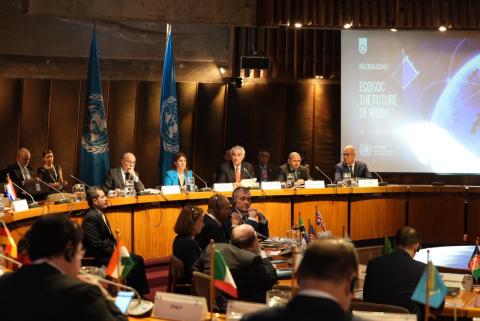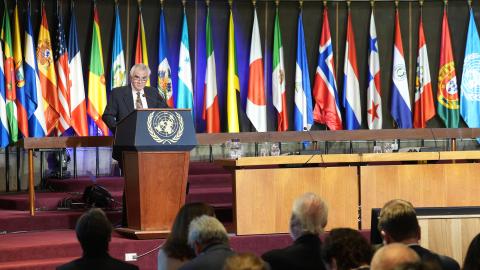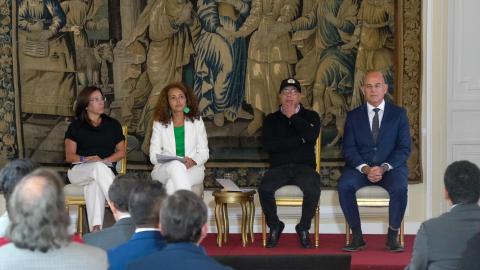News
On 26 June, when concluding his tour around Brazil, Argentina, Uruguay and Chile, the Chinese Prime Minister Wen Jiabao chose the Economic Commission for Latin America and the Caribbean (ECLAC) for delivering a speech making five concrete proposals through which China intends to define its future presence in Latin America and the Caribbean. The latter is a transcendental milestone that will certainly have a transforming effect in the structure of our region.
First of all, Prime Minister Wen proposed the intensification of strategic cooperation between China and Latin America and the Caribbean building on mutual political trust by creating the Chinese-Latin American and Caribbean Cooperation Forum, a regular dialogue mechanism between China and the CELAC's troika. He recognized that CELAC translates into an improved cohesion and regional solidity like it was never seen before. The scale does matter and this plurinational space is fundamental. For this reason, he intends to call the first meeting of the above-mentioned mechanism this year.
Second, he expressed China's will to increase the exchange trade volume to 400 billion dollars within the next five years - which would double current figures. This is an aim explicitly showing that China does not pursue trade surplus and that it is willing to import also manufactured, high-added-value products beside commodities, with a view to achieving balanced and sustainable trade for both parties.
Third, in the aim of strengthening cooperation regarding investment and finances, Prime Minister Wen announced that his country proposes the creation of the Chinese-Latin American and Caribbean Cooperation Fund, to which Chinese financial institutions will contribute with 5 billion dollars as a first package aiming to promote joint investment for cooperation projects linked to the manufacturing industry, high and new technologies and sustainable development.
At the same time, the China Development Bank will enable a special line of credit of 10 billion dollars intending to promote cooperation for building infrastructure, i.e. railroads, roads, seaports, power plants and lines, and telecommunication facilities.
Fourth, he underlined the importance of food security, for which he suggested the creation of a food reserve of 500,000 tons for humanitarian aid. Furthermore, he stressed the importance of establishing a forum for ministers of agriculture, to be ready by 2013, as well as a fund of 50 million dollars and the support of six research centers for strengthening agroindustry, manufacturing, science and technology.
At last, he highlighted the importance of supporting cultural exchange, communication, sports and the promotion of tourism between Latin America and China.
China has proved its ability to become, in barely three decades, the second largest economy and the most dynamic pole in the world, giving birth to a new geography in the international sphere. In a period in which the world economy is facing times of high uncertainty, most of industrialized economies facing several years of low growth, fiscal vulnerability and high unemployment rates, China consolidates is position as the fastest-growing among the globe's main economies.
Moreover, the country is becoming a fundamental trade partner in our region and its importance grows every year. The high Chinese demand for food, energy, metals and minerals has benefitted the countries exporting those products, therefore improving their exchange terms and stimulating their growth. Likewise, in 2011, China took over the European Union as the second origin of regional imports. Moreover, South-South trade growth is well over twice as high as global trade growth. As of 2001, trade between China and the region has shown an average annual increase of more than 30%, amounting to 241.5 billion dollars in 2011.
Wen Jiabao expressed his will to make joints efforts to follow an intense agenda that denotes the substantial leap made by China concerning the form and substance of its presence in the region. In this context, the message that China intends to send by means of one of its highest qualified spokespeople, Prime Minister Wen Jiabao, represents a turning point in the quality of the relationship with Latin America. It is a comprehensive proposal significantly motivated by the will to consolidate a political dialogue marking a substantial leap in the form and substance of China's ideal of a shared-prosperity project.
At ECLAC, we believe that we are witnessing the rise of one of the most important and relevant cornerstones of South-South cooperation in the future; a direct invitation from the motor of Asia; a horizon of new constructive possibilities that we are pleased to welcome.
Alicia Bárcena
Executive Secretary
Economic Commission for Latin America and the Caribbean (ECLAC).


